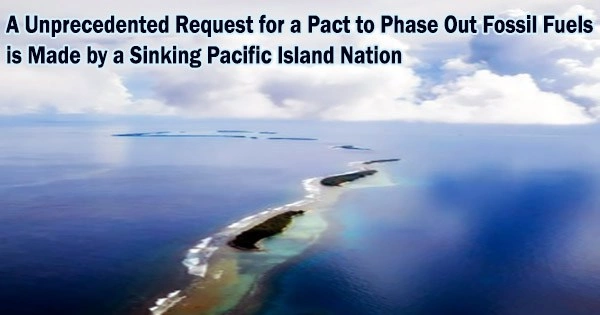SHARM EL-SHEIKH, Egypt – Tuvalu, an island nation in the South Pacific, asked nations attending the COP27 climate summit on Tuesday (November 8, 2022) to draft a worldwide agreement to gradually phase out the use of fossil fuels.
The low-lying nation is the first to make such a request at the U.N.’s main climate meeting. It faces an existential threat from rising sea levels.
“The warming seas are starting to swallow our lands inch by inch. But the world’s addiction to oil, gas and coal can’t sink our dreams under the waves,” Tuvalu Prime Minister Kausea Natano said in a statement.
“We, therefore, unite with a hundred Nobel Peace Prize laureates and thousands of scientists worldwide and urge world leaders to join the Fossil Fuel Non-Proliferation Treaty to manage a just transition away from fossil fuels.”
Tuvalu makes the same request for a treaty on the non-proliferation of fossil fuels as its Pacific neighbors. In September, Vanuatu demanded the creation of such a mechanism at the U.N. General Assembly.
To date, only a few tiny nations have supported the project, and the fossil fuel sector has frequently pushed to emphasize the significance of energy security in the switch to renewables.
The announcement on Tuesday comes as global calls to stop using fossil fuels gain pace. The European Parliament, the Vatican and the World Health Organization have all backed the proposal in recent months.
While the cost of living is in a crisis and energy prices are high, oil and gas giants have recorded record profits.
On Monday, Antonio Guterres, secretary-general of the United Nations, urged all governments to tax the “windfall profits” of fossil fuel companies and divert the money to individuals facing rising food and energy prices as well as to nations experiencing loss and damage as a result of the climate catastrophe.
“Vanuatu and Tuvalu are the first countries to call for a new Treaty as a companion to the Paris Agreement to align oil, gas and coal production with a global carbon budget,” said Tzeporah Berman, chair of the Fossil Fuel Treaty Initiative.
“We will look back on this in history as the moment of reckoning with overproduction that is locking in further emissions and holding us back from bending the curve,” Berman said.
What does the treaty call for?
The goal of the convention on the non-proliferation of fossil fuels is to provide a framework for preventing the production of new coal, oil, and gas.
To be sure, the burning of fossil fuels is the chief driver of the climate emergency and a flurry of U.N. reports in the run-up to climate talks in Egypt’s resort town of Sharm el-Sheikh warned that urgent and collective action is needed to avert catastrophe.
In order to prevent global warming from exceeding the critical threshold of 1.5 degrees Celsius and to enable a transition to renewable energy where no community or nation is left behind, the treaty also aims to reduce current production.
“Big ocean states have provided so much leadership to international policy-making,” said Harjeet Singh, head of global political strategy at Climate Action Network, which includes more than 1,500 civil society groups.
“Big ocean states pushed for the 1.5C target, they’ve pushed for loss and damage, and now they’re pushing for a Fossil Fuel Non-Proliferation Treaty. This is the next necessary step in international climate policy for climate justice,” Singh said.
Last year, Simon Kofe, the foreign minister of Tuvalu, delivered his statement at the COP26 conference while knee-deep in the ocean in an effort to highlight the nation’s vulnerability to global warming.
















